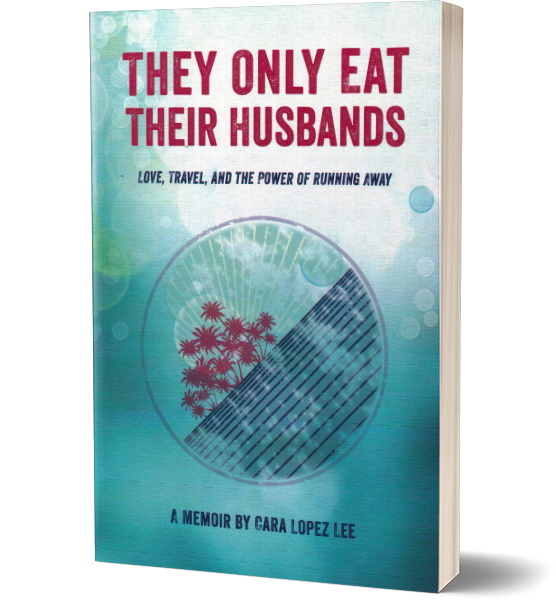I hope you’re not offended by what some call foul language, bad words, or expletives. If so, you may want to refrain from reading part three of this series. As a writer, I consider all words to be part of my toolbox. All words can be good or bad, depending on the time and place, the context and intent. In this case, the choice word in question merely illustrates what my companions and I discussed on day three of our trek. I don’t wish to censor it, as that would stunt the story. So, with that disclaimer out of the way, let’s head back into the forest to finish our trek among the hill tribes of northern Thailand…
DAY THREE – SAY WHAT?
Long before sunrise, I transferred my hatred from the village cats to the roosters. The feathered fiends started crowing at 4:00 a.m. The hard floor had already robbed me of sleep, and I’d lost my earplugs. We all woke up grouchy, except Carly, who had earplugs, a strong back and a snore that probably woke the damnable roosters in the first place.
After a Western-style breakfast of eggs and toast, we watched more than a dozen villagers add a new roof to a hut. Women handed up bound rows of dried leaves – elephant ears or the like – and men tied them into place. It reminded me of an old-fashioned American barn raising. This was a community effort, and for a moment I envied them; throughout my adult life I’ve rarely known my neighbors.
We didn’t linger long before moving on. There was less rain today, so there was less slippery mud. However, it was the most strenuous day of the trek. We walked steeply uphill and downhill, over hard-packed but uneven terrain, through intense waves of heat unrelieved by moisture. We marched some five hours before lunch.

Pricha used his machete to whack down several elephant ear leaves and wove them into a hat, which he gave me.
Pricha used his machete to whack down several elephant ear leaves and wove them into a hat, which he gave me. He said it was supposed to look like a buffalo head, although Pete and Collin said it made me look like a woodland elf. Tickled, I wore the hat all day, even after it wilted.
Maybe I got too carried away by the attention. We stopped to take group pictures, and each of us took a time-release photo. I don’t know what possessed me, but when it was Collin’s turn, I played the most juvenile joke in the book: I put rabbit ears behind his head. When the camera clicked, I felt the heavy weight of mass disapproval.
“That’s fucking cold, man,” Pete said.
“Why’d you do that?” Collin asked.
He rallied quickly for revenge. I set up my shot next, and rushed to my place just in time for Pete and Collin to turn and moon the camera. Carly doubled over with laughter, but Tuk and Pricha looked appalled.
Afterward, Tuk walked in silence for some time. Finally, he asked why the guys had mooned my camera. “I am wondering… in our culture this gesture is bad. It mean big insult. But you all laugh. It not mean the same for you?”
Carly explained, “It can be an insult in our culture, too. But usually it’s meant as a joke.”
“It’s not something most people do very often,” I said. I was concerned that Tuk would think Americans were in the habit of mooning each other on a regular basis.
But he moved on to another question. “There is another thing I would like to understand. I meet many people from America and Europe and I hear them use what you call the ‘F-word.’ I think this is a bad word and this is a word mean you are angry. But on one trek there was a woman who she seem happy the first day. But after that she keep saying ‘fuck,’ when she trip, or when she bump into something, or when she get tired. I think she is angry, and maybe she is angry with me. What do you think?”
“Well, you’re right, it is a bad word,” Carly said. “But it doesn’t always mean you’re angry. It can be what we call an exclamation.”
“Eck-some…?”
“Exclamation…” Carly looked at me for help.
“A burst of feeling, to show pain or frustration or surprise.”
Pete jumped in with, “It can be used as a verb, an adjective, an adverb, or a noun. A verb, like, ‘I’ll be fucked if I know.’”
“Or an adjective,” Carly said, “like, ‘this is fucking great.’”
“Or a noun, like ‘dumb fuck,’” I said.
We all chimed in, one after another – “Fucking awesome! Fuck that! Fan-fucking-tastic! I fucked up! I’m fucked up! You’re fucked!”—until Tuk shook his head and laughed, protesting that he couldn’t keep up.
Collin told me, “My favorite is the one we say at work sometimes: ‘Why don’t you go outside and play ‘hide-and-go-fuck-yourself.’” I laughed so hard that he touched my shoulder and asked, “Are you okay?” Apparently he’d forgiven me for fucking up his photo.
We stopped for lunch at a rocky stream, where Tuk and Pricha again pulled out their machetes, this time to hack down hollow bamboo and carve it into trenchers, cups and spoons. Carly marveled that the machete “has a hundred uses.” We used the handmade utensils to wolf down the rice-and-vegetable dish Tuk had packed. Then Pete and Collin went for a dip in the pool, while Carly and I sunned on the rocks.
As we prepared to leave, Tuk cried out in alarm and pointed out a fire ant climbing into my boot. “This ant bite is much worse than bee sting.” Upon hearing that, I screamed, “Fuck!” leapt out of my boot, yanked off my sock and hopped on one foot while maniacally swatting at the other.
We walked another half-hour to a hut at the jungle’s edge, where we collapsed hot and tongue-lolling on the porch, waiting for our truck back to Pai. The driver was late and Tuk was irritated. When the driver pulled in, Tuk, who’d been soft-spoken and patient throughout the trip, stunned us when he shouted, “FUCK!” at the top of his lungs, then yelled at the driver in Thai.
After three days in the forest, that one shouted English word was a reminder that nothing is ever quite as it seems. I’ve observed that Thai people seem to have a tendency toward soft-spoken kindness, that they’ll tell you what you wish to hear rather than risk being rude. Is it true? I don’t know. I only know that yelling “fuck” on a difficult day is something I can understand. It is the crude and colorful American machete of uncontrolled emotion.
It is the sound of failed expectations. It is the sound of devouring ants. It is the sound of goodbye.
***
(The names of the people in this series have been changed.)




